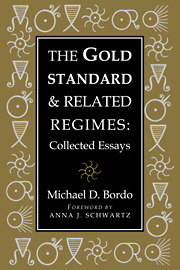Book contents
- Frontmatter
- Contents
- Foreword
- 1 The Gold Standard and Related Regimes: Introduction to the Collection
- Part I History of Doctrine and the Gold Standard
- Part II The Gold Standard as a Commodity Standard
- Part III The Gold Standard as a Contingent Rule
- Part IV Historical Case Studies
- Part V The Bretton Woods International Monetary System
- Index
- Titles in the series
Foreword
Published online by Cambridge University Press: 19 October 2009
- Frontmatter
- Contents
- Foreword
- 1 The Gold Standard and Related Regimes: Introduction to the Collection
- Part I History of Doctrine and the Gold Standard
- Part II The Gold Standard as a Commodity Standard
- Part III The Gold Standard as a Contingent Rule
- Part IV Historical Case Studies
- Part V The Bretton Woods International Monetary System
- Index
- Titles in the series
Summary
Gold has had a varied history in human experience. Its earliest use was as one of many commodities that served as a medium of exchange. In time, gold attained preeminence over other commodity monies. In the fourteenth and fifteenth centuries gold coins were used to settle large transactions in international trade, with less valued metallic coins used in domestic trade. In 1717, Sir Isaac Newton, then Master of the Mint, assigned a higher silver price for the English gold guinea than the international market price, and, as a result, silver coins were driven from circulation. England inadvertently became a gold standard adherent, pledging to redeem in gold other forms of money. Other countries at the time were on a silver or bimetallic standard and also pledged convertibility.
Convertibility, however, was suspended in wartime, when governments raised money to finance their expenditures by borrowing at home and abroad, by explicit taxation, by debasing the coinage, and by expanding non-gold forms of money and thereby imposing an inflation tax. The part gold played in the monetary system was thus intimately related to the government's budget needs. In the last two decades of the nineteenth century many countries quit the silver or bimetallic standard and adopted the gold standard.
Many of the chapters in this collection focus on how the classical gold standard that prevailed from 1880 to 1914 worked in theory and in practice.
- Type
- Chapter
- Information
- The Gold Standard and Related RegimesCollected Essays, pp. ix - xPublisher: Cambridge University PressPrint publication year: 1999



